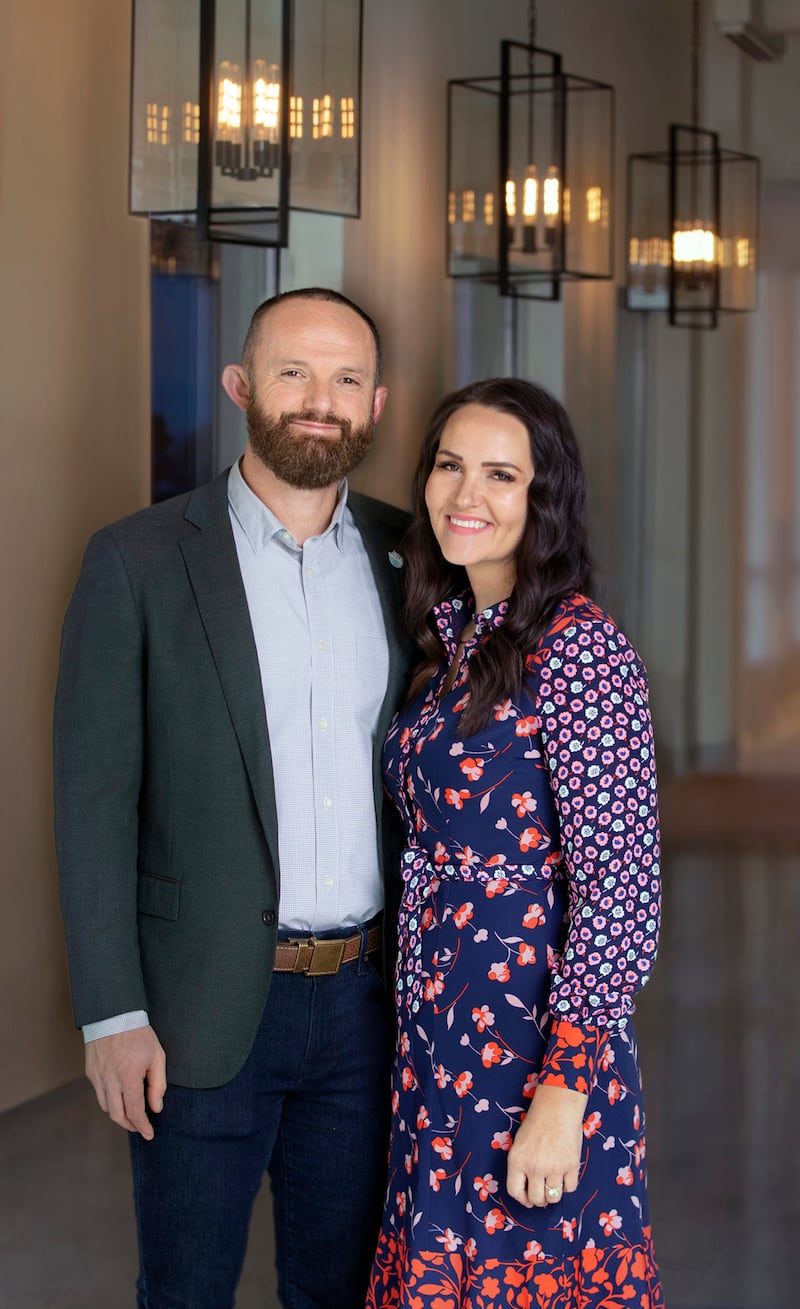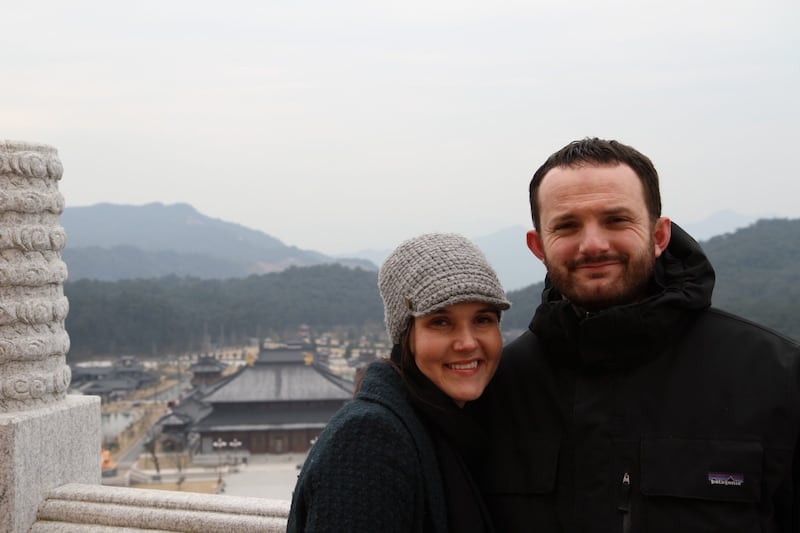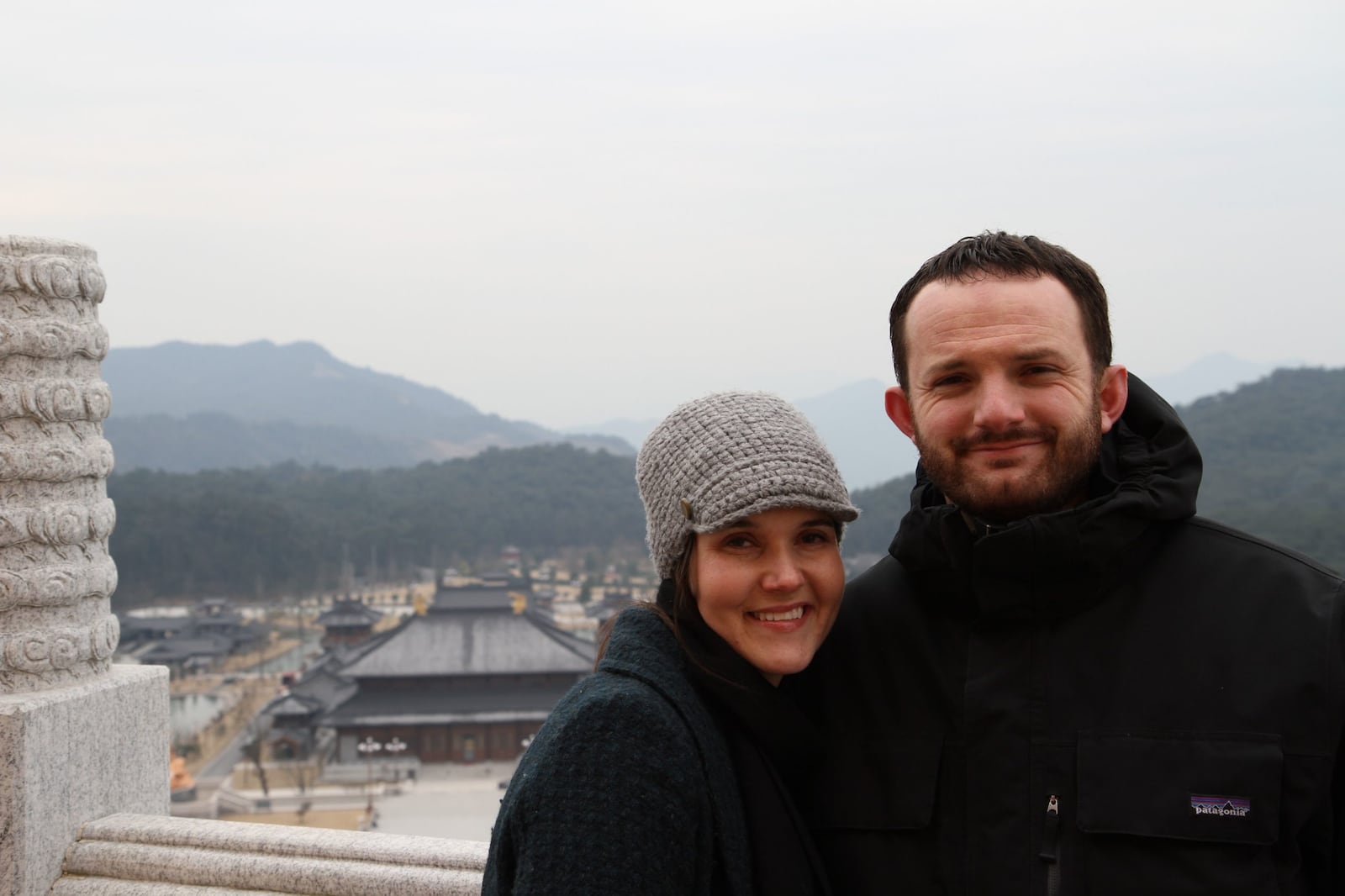The Founder Series is a weekly column by and about Utah founders and how they got to where they are today. Click here to read past articles in the series.
The year was 2003. I was getting a master’s in accounting at Utah State University, and my wife Kacie was working at a popular buffet restaurant. We were very recently married and very much still figuring out what we wanted to do with our careers, though it was pretty clear to Kacie that she did not want a long-term job at the restaurant.
When we moved in together as newlyweds, we needed to upgrade our sleeping arrangement. (Kacie was appalled to find I still slept on sheets I bought at a garage sale in Mexico. I maintain that I got a great deal on them.) We went to a Downeast tent sale and found a double-pillow-top, king-size Stearns & Foster mattress (with only minor damage!) for $75.
We bought the mattress immediately, even though everyone warned us that sheets for a king would be absurdly expensive. Of course, when we started shopping for sheets, we were shocked to discover how right the warnings had been. The available bedding was unattractively packaged and poorly marketed. Kacie’s business brain started to spin, and she said, “I bet we can do it better.”
So we did.

Just the two of us
Kacie and I learned how to run our business by jumping straight into work. We started very small to test the waters but found that Kacie’s instincts had been right—there was a gap in the market for better sheets. The rush we got from selling one set kept us going because even small achievements felt like huge accomplishments. Our financial goal back then was simple but strict: make $1,500 a month if we wanted to survive.
Even as bankruptcy loomed over our shoulders, it was exciting to create a tangible business. We “warehoused” sheets in our two-bedroom apartment, and I hand-delivered them in a small truck to some of our first accounts. Soon, we had to move out of the bigger bedroom in our apartment to make room for more product. Our king bed barely fit in the smaller room, and we had to sort of leap in from the bottom because there wasn’t enough room to walk around the sides.
Some of the lessons we learned in the early days stuck with us, like how to remove self-consciousness from creativity. Sometimes as entrepreneurs, you have to let go of your pride and hold on to whatever money you can. For years, until it was made illegal, we got all our boxes to ship product from the liquor store. We were able to save hundreds of dollars, the product always fit inside perfectly, and we made some great friends with the store staff. Plus, our customers enjoyed getting their luxury sheets in fancy wine boxes.
Another way we got super creative was in how we found funding. It was essential that we took some financial leaps of faith, but we were too young and inexperienced for banks to seriously consider us for business loans. We weren’t aware of VC firms at the time (and likely wouldn’t have been able to put together a convincing pitch, as we were still working out most of the kinks as they came). So we had to think of something else.
Whenever we share this next piece of our story, we always have the disclaimer that we do not advise that anyone else ever try this. There are much better ways to get funded now. Pre-2008, you could qualify for zero-interest credit cards relatively easily. So, we did—lots of them. As an early-days relic, Kacie and I still have the binder that houses the credit cards we used to fund our business. It took about a quarter of my time, but we were able to successfully manage around 100 active credit cards and nearly $2 million in interest-free money to scale things in a way we could never have imagined. And today, we have great credit scores!
Despite the financial stress, timing was on our side, and that bolstered our innate creativity. The early 2000s was a great time to be young and willing to adapt to the shift to selling product online. It was also a great time to finance a business through low-interest credit cards, neither of which would fly now.
The turning point
For seven years, we ran the business completely by ourselves. Kacie and I did it all from product development, photography, marketing, shipping, fulfillment, customer service, and warehousing—the list goes on and on. We could have continued, just the two of us, and had a moderately successful business. But instead of capping out, we found the key to our success: people.
As soon as we hired someone else, it clicked. Kacie and I knew that we could do everything ourselves, but that meant we didn’t do anything thoroughly. Instead, we discovered that we could hire people who could do it BETTER than we could! New team members were able to dive wholeheartedly into the different functions, and our productivity and efficiency skyrocketed. Their expertise created space for Kacie and me to think of new ideas and research those other gaps in the market that needed to be filled.
Soon after expanding our team for the first time, we were able to add to our lineup of bedding products with mattress protectors, comforters, duvet covers, and the big-ticket item that found a huge audience: rolled and compressed mattresses in a box that could ship straight to customers’ doors. This innovation allowed us to add even more employees, and we currently have a team of about 1,600 people.
One of our favorite things is that the company personality grew as our team grew. Our people identified as scrappy workers, willing to do what was needed to make us better. We all owned our piece of the business, and we shared a vision of where we could go. There weren’t a ton of resources at our disposal, but we made it work. And most importantly, we bonded over an unspoken commitment to kindness, integrity, and fun.

Though we’ve experienced tremendous growth and change, many of the things we’re known for now—including our system of values—have roots in the early days, and I am really proud of that. Lunch is a great example. Back in the day, it was just easier to eat lunch in the office. We’d use the shared time to collaborate, catch up, and answer questions. The food was unpredictable, depending on who was in charge of lunch that day. But everyone agreed that time was essential to keep the team connected.
Today, we have an amazing kitchen team of 20 at our headquarters who tend an on-site garden, prepare fresh and healthy food, and make a mean burrito. The tenants of lunch are the same: cross-department collaboration and connection points for people who might not otherwise get a chance to see each other.
Another example of cultural evolution is our Thursday Morning Meeting. Its origins are in the all-hands-on-deck weekly meeting where we broke down work responsibilities. Currently, we have a monthly meeting to celebrate wins, exciting announcements, and big-picture check-ins. In the last year, we’ve talked about Covid, supply chain issues, huge brand partnerships, PTO changes, and company wins. We’ve even had marriage proposals, patriotic fashion shows, spelling bees, pie-eating contests, and an epic April Fool’s joke. You truly never know what’s going to happen in that meeting.
There are some things we did at the beginning that haven’t made it to where we are now, but for the most part, the things that have deeply resonated with a team of 20 can still work with a team of 500.
Malouf Companies today
Our corporate office has always been based in Logan, Utah. First, we got very overcrowded in a small office that could reasonably fit 20 people, though we crammed more in. Then, we went to a slightly bigger office and crammed more people in. Finally, we built our own office that we thought was big enough to house more employees than we would EVER have—200 people.
Are you sensing a theme yet?
Currently, we’re entering the third construction expansion project to add 300 more seats to the building we thought could never be too small. We also received support from the Governor’s Office of Economic Opportunity to build an entirely new building and bring more high-quality, high-paying jobs to Cache Valley. We think it will be big enough, but we’ve been wrong before.
Alongside the explosion of new team members, we’ve also seen an explosion of scope. We were firmly planted in the bedding category for a large percentage of our company history, but we’ve seen huge success in the lifestyle and wellness space. Our core business is home furnishings, but the company structure has evolved into six key categories (consumer products, services, technology, retail, logistics, and venture) through a suite of nationally recognized brands and partnerships.
Our teams are vertically integrated and wholly able to support our business strategies from start to finish. We have distribution centers in Utah, California, Ohio, Texas, North Carolina, and South Carolina that support daily sales of over 30,000 products (that’s more than two a second) both online and in major stores in 58 different countries. It’s a riff on Kacie and I doing everything—but much, much better.
We proudly became a Certified B Corporation® in 2019, which means that, as a company, we’re concerned not only with revenue but also with our corporate social responsibility for society, workers, the community, and the environment. A huge part of our B Corp™ certification is the work we do through the Malouf Foundation, which we founded in 2016 to confront child sexual exploitation. Domestic abuse shelters, restorative care centers, foster families, and safe homes started asking us for product donations to create safe spaces to sleep, which led to our being educated on sexual exploitation and violence in our communities. The Malouf Foundation is now the heart of the company, and company resources support a lot of the work we do.
January is National Slavery and Human Trafficking Prevention Month, and Kacie and I would like to invite Utah Business readers to take a moment and educate themselves on the problem. We’ve created a free, hour-long training—led by survivors of sex trafficking—that is designed to empower you to recognize and prevent sex trafficking in your communities, available at IAmOnWatch.org.
We’ve also been able to acquire other Utah-based businesses and have connected with some truly amazing founders. In 2019, we added mental health innovators Impact Suite, led by Clay Olsen, to our portfolio. The collection of apps they’ve developed uses community, coaching, and therapy to address four major areas: depression and anxiety, substance abuse, sexual compulsivity, and personal growth.
In June 2020, we brought household name and signature Utah brand Downeast into the fold. We loved the Freedman family history and knew that recognition behind the name Downeast is incredibly high in Utah. We were also looking to diversify our home furnishings product offerings outside the bedroom, and Downeast Home was doing a lot right with beautiful pieces and high expertise in craftsmanship. Plus, our Downeast mattress purchase years earlier set our whole enterprise in motion, so it felt a little like fate.
After combining with Downeast, who had a 30-year history of growth, we looked to the opposite end of the spectrum—we wanted to find the freshest companies in Utah to help grow and develop. That same year, Kacie and I became partners at Tamarak Capital, a venture-focused family office in Springville, Utah, where we’ve since developed business and personal relationships with some of the brightest new companies and founders.
To some, our strategic moves may look disconnected, but Kacie and I know that at the heart of these businesses exists a genuine connection to lifestyle and wellness.
The future of Malouf
People ask all the time—what’s next for us? In 2021, we officially made the switch to calling ourselves Malouf Companies, which feels like the first step to embracing our future. But I’m sure if you asked us 18 years ago, our answer would have been wildly different than our reality today.
I’ll keep the predictions high-level in case someone quotes this in 2040. We know we’ll keep taking calculated risks and making mistakes. We know for a fact that we will keep investing in people, both through the business and the Malouf Foundation. And, we hope that we learn just as much as we did in our first 18 years as founders.

